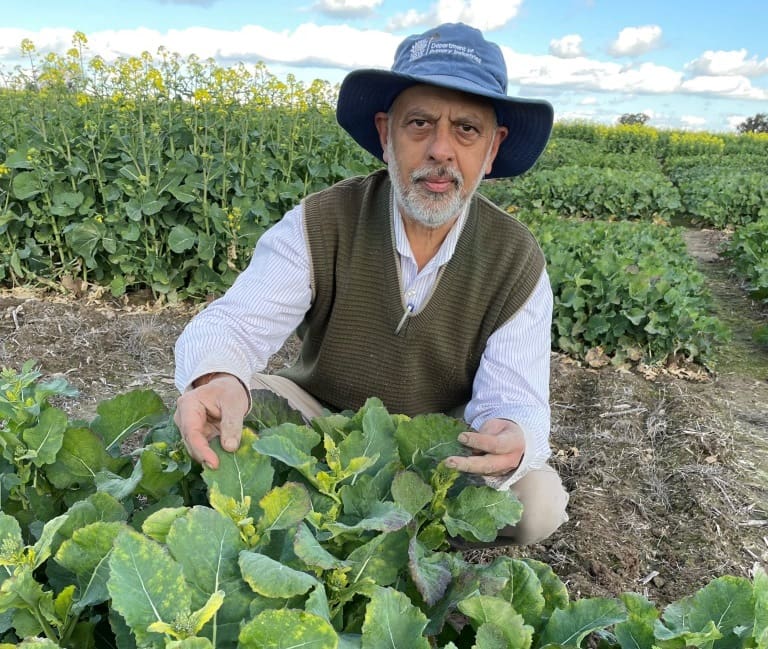
Dr Harsh Raman in a trial plot with canola showing the effects of manganese toxicity. Photo: NSW DPIRD
Soil acidity is a significant challenge for crop production in Australia, and crops like canola are particularly vulnerable to the adverse effects of acidic soils which can limit growth and reduce yields.
New South Wales Department of Primary Industries and Regional Development senior principal research scientist Harsh Raman said the the discovery was the result of five years of dedicated research by an international team of scientists, with NSW DPIRD leading the effort.
“Soil acidity is a global issue, severely limiting crop production and affecting a huge 13.7 million hectares in NSW alone,” Dr Raman said.
“After conducting a range of experiments in controlled field conditions, NSW DPIRD has successfully cloned the specific gene responsible for manganese tolerance in acidic soils.”
“We have also uncovered new insights into the genetic networks that influence this trait, which will enable the research team to develop practical methods for selecting canola plants with manganese tolerance based on morphological traits and molecular markers.”
According to Dr Raman, the discovery could lead to higher productivity and improved profitability for canola growers.
“By understanding how canola plants cope with excessive manganese in acidic soils, researchers and crop-breeding companies can now work towards developing new crop varieties that are more resilient to the stresses of manganese toxicity,” Dr Raman said.
While manganese is an essential nutrient for plant growth, excessive amounts in acidic soils, namely those with a pH values of less then five, can lead to severe toxicity which can stunt plant growth and reduce yields.
This is most common in waterlogged soils or those with poor drainage, particularly under high-temperature conditions.
Dr Raman said while researchers still recommend a regular application of lime to manage high-acidity soils, manganese tolerance is a valuable enhancement trait for canola varieties by allowing growers to crop without having to wait for lime to ameliorate.
“Thanks to this research, canola farmers will no longer exclusively need to invest significant time and money into lime applications and wait for amelioration to proceed before they can grow high-yield crops.
“Now, by unlocking the secret to cultivating varieties that are tolerant to acidic soils, growers can grow high-yielding canola whilst applying lime to improve their soils’ long-term pH, increasing productivity and profitability.”
The project was supported by the NSW DPIRD, the Grains Research and Development Corporation, Oil Crops Research Institute China, Monash University, ARC Training Centre for Future Crops Development at Australian National University and Wagga Wagga, and INRA France.
The research findings were published last month in the Plant Cell and Environment journal under the title Genome‐Wide Association Study Elucidates the Genetic Architecture of Manganese Tolerance in Brassica napus.
Source: NSW DPIRD

HAVE YOUR SAY